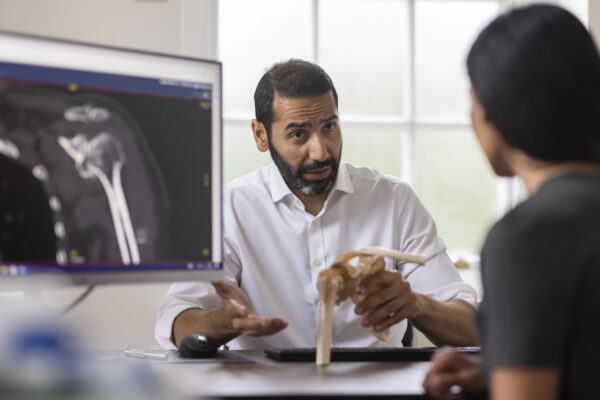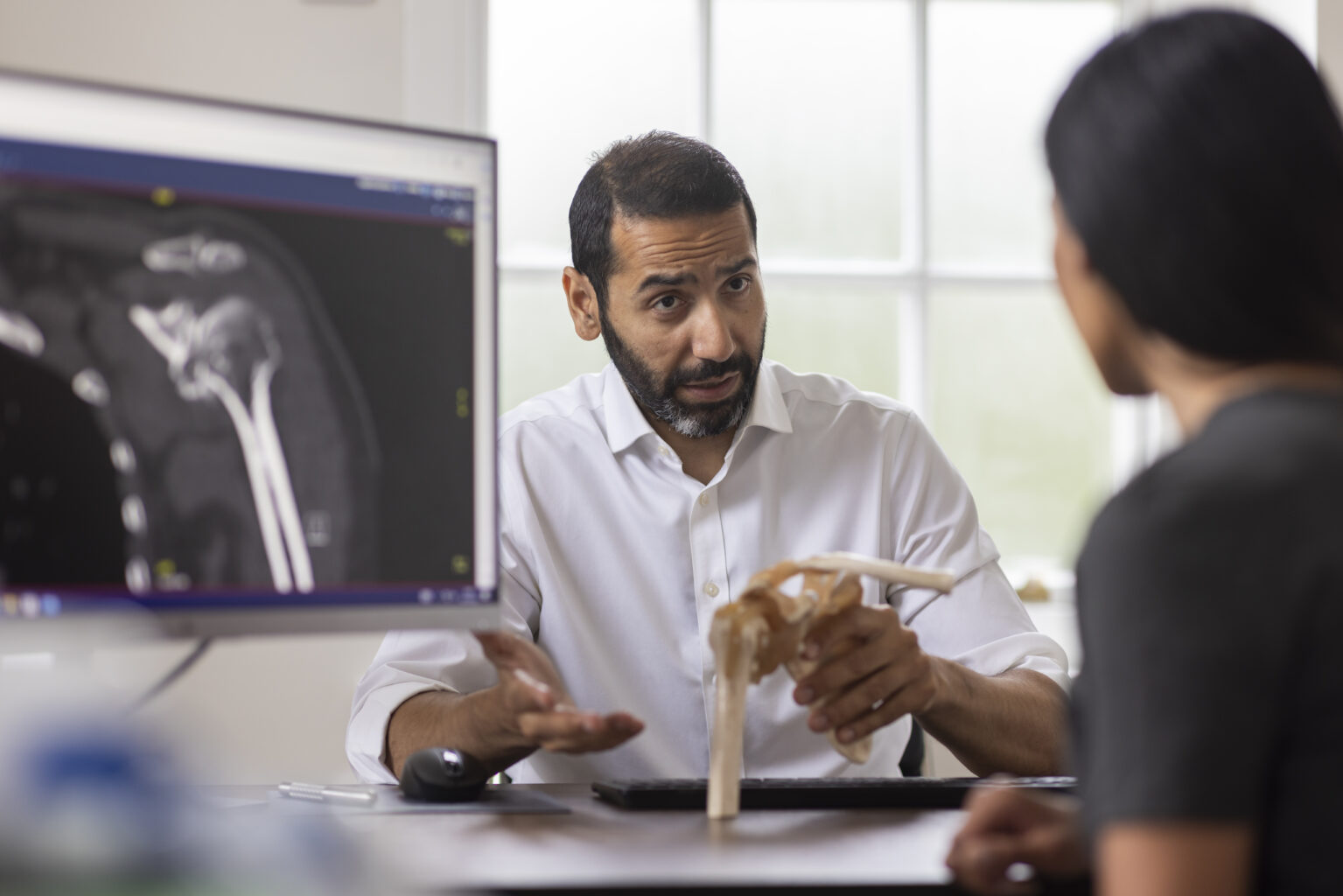Contact number: 020 7806 4060
What is Shoulder Decompression Surgery?
Shoulder decompression surgery involves removing or reshaping parts of the bone or soft tissue that are pressing on the tendons or bursae in the shoulder joint. This procedure increases the space in the subacromial area, reducing pain and allowing smoother movement.
It is commonly recommended for conditions such as:
- Shoulder impingement syndrome
- Chronic rotator cuff inflammation
- Bursitis that hasn’t responded to non-surgical treatments
The surgery is typically performed arthroscopically, using small incisions and specialised instruments, minimising tissue damage and promoting quicker recovery.
Shoulder Decompression Surgery at St John & St Elizabeth Hospital
At St John & St Elizabeth Hospital, we provide personalised care for patients requiring shoulder decompression surgery. Our experienced surgeons use advanced techniques to ensure effective treatment and support your recovery.
Why choose us for shoulder decompression surgery?
- Specialist Orthopaedic Surgeons: Our consultants have extensive expertise in shoulder surgery and joint care.
- Minimally Invasive Techniques: Arthroscopic procedures reduce scarring, pain, and recovery time.
- State-of-the-Art Facilities: Our hospital is equipped with modern imaging and surgical tools to ensure precise and effective treatment.
- Accessible Location: Conveniently based in NW8, we serve patients from Hampstead (NW3), Kilburn (NW6), and across London.
We are dedicated to helping you achieve relief from shoulder pain and regain mobility with compassionate and expert care.
Consultants who perform Shoulder Decompression Surgery in London
How Much Does Private Shoulder Decompression Surgery Cost?
from £3,650*
The cost of Shoulder Decompression starts from £3,650* at St John & St Elizabeth Hospital.
*The price shown is an estimated guide to the hospital charges associated with your treatment from admission to discharge. Your final cost may vary depending on your individual clinical needs, the procedure performed, any additional treatments required, the type of implant/prosthesis used (where applicable), and the length of stay. This guide price excludes consultation fees, diagnostic tests, and professional fees charged separately by your surgeon, anaesthetist, and any other specialists involved in your care.
How to pay for your treatment
If you’re… paying for yourself
Did you know you don’t need private medical insurance to come to St John & St Elizabeth Hospital? As a self-pay patient, you can access safe, outstanding quality health care at times to suit you.
For scans and tests, as well as to see most consultants, you’ll still need to be referred by a medical professional like your GP, but as a self-pay patient, the process is more straightforward. You won’t need authorisation from an insurance provider, and you’ll have greater choice of consultant and appointment times.
If you’re… insured
St John & St Elizabeth Hospital is approved by all major medical insurance companies. If you have a personal private health insurance policy, or your company provide it for you, you can use it to pay for your care from your initial consultation through to treatment, surgery and aftercare such as physiotherapy. Not all private health insurance plans cover the same things. It’s very important to check exactly what you are covered for with your insurance provider.
Frequently Asked Questions About Shoulder Decompression Surgery
St John & St Elizabeth Hospital is located in St John’s Wood (NW8), a well-connected area of North West London. We are conveniently accessible for patients from Hampstead (NW3), Kilburn (NW6), and beyond.
By Tube:
- St John’s Wood station (Jubilee Line) is just a 5-minute walk from the hospital.
- Finchley Road (NW3) and Kilburn stations (NW6) on the Jubilee Line provide excellent connections.
By Bus:
Wellington Road: Routes 13, 46, 82, and 113 stop near St John’s Wood Underground Station, just a short walk from the hospital.
Circus Road: Routes 46 and 187 stop close to the hospital’s Circus Road entrance.
Abbey Road: Routes 139 and 189 stop near the junction where Grove End Road becomes Abbey Road, providing easy access.
Major Roads:
If you’re travelling from NW3 or NW6, major routes such as Finchley Road or Kilburn High Road offer a direct approach to the hospital.
Our hospital ensures convenient access for patients across London, particularly those in NW8, NW3, and NW6 postcodes.
The procedure typically takes 30 to 90 minutes, depending on the complexity of the condition and whether additional repairs are needed.
The procedure is performed under anaesthesia, so you won’t feel pain during surgery. Mild discomfort and swelling are normal after surgery but can be managed with medication and rest
Recovery involves rest, physical therapy, and a gradual return to activities. Most patients can resume light activities within a few weeks, but full recovery may take three to six months, depending on the severity of the initial condition.
After shoulder decompression surgery, it’s likely that you’ll have some difficulty with normal activities for a little while. It’s important that you take recovery time seriously.
Following the surgery, physical therapy and rehabilitation are essential for a successful recovery. You’ll have your arm in a sling for around two weeks after the operation and an upper limb physiotherapist will work with you to gradually regain shoulder strength and range of motion.
The rehabilitation process can take from three to six months, and it’s crucial to follow the therapist’s guidance and any postoperative instructions provided by your surgeon.
Surgery is recommended for patients with persistent shoulder pain, impingement, or limited mobility that has not responded to non-surgical treatments such as physiotherapy or injections.
Common symptoms associated with this condition are:
- pain in the top and outer side of your shoulder
- pain that feels worse when you lift your arm over your head
- pain or aching along the shoulder blade at night – impacting your sleep (this is especially prevalent for those who are side sleepers)
- weakness in your arm and shoulder muscles
Shoulder decompression surgery is often carried out through a keyhole procedure, which means that the surgeon will use a small incision to explore the extent of the shoulder impingement. They may need to repair any damage caused to the tendons or cut away any muscle around the rotator cuff tendon. In some instances, to relieve shoulder pain caused to the damaged tendons, the team will use their specially designed surgical instruments and turn the keyhole surgery into an open operation.
If this is done, you may be left with a larger subacromial decompression scar than if you only had a keyhole procedure.
Medically reviewed by Mr Abbas Rashid - BSc(Hons) MBBS FRCS(Tr&Orth) on 02/02/2024


